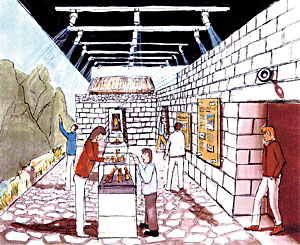 | The Peabody Museum's exhibit on Machu Picchu will include a road such as those paved by the Incas, as well as a 25-foot-long panorama of the view from the ancient site. Lining the sides of the exhibit hall will be display cases containing artifacts recovered from Machu Picchu, including gold beakers and bowls, pottery and elaborate textiles. |
The Peabody Museum of Natural History has announced that the National Science Foundation (NSF) has given $351,000 to support the upcoming exhibition "Machu Picchu: Unveiling the Mystery of the Incas," which will open on Jan. 26.
The grant was awarded to Yale anthropology professor Richard L. Burger, director of the Peabody Museum and the project's principal investigator, and Lucy C. Salazar, a manager at the Peabody and co-principal investigator.
Awarded by the NSF's Elementary, Secondary and Informal Education Division, the grants support projects that "provide rich and stimulating opportunities outside formal school settings where individuals of all ages, interests and backgrounds increase their appreciation and understanding of science, mathematics, engineering and technology."
The NSF grant will allow the exhibit to increase public awareness and understanding of the power of scientific archaeology by demonstrating how it has made possible a textured understanding of the Inca royal estate of Machu Picchu and Inca civilization in general.
Components of the exhibit will emphasize the interdisciplinary links of the sciences (chemistry, astronomy, engineering, environmental sciences, mathematics and biology) to the social sciences (anthropology) and other disciplines (history and Latin American studies) through the study of Machu Picchu. The museum is also developing a curriculum for grades 7-9 which will be built around national standards in science, mathematics and the social sciences.
The exhibit will invite visitors to "travel" into the past, first to Machu Picchu with the 1911 Yale Peruvian Scientific Expedition, and then further back to when Machu Picchu functioned as an Inca country palace in the late 15th century A.D.
It will include dioramas, topographic models, thematic video displays and computer interactives, and hundreds of actual objects recovered from Machu Picchu. These materials will be used as a springboard for a discussion of archaeological science and the way in which knowledge of relevant aspects of ecology, astronomy, metallurgy, human biology and other scientific subjects have proved to be critical in order to understand the purpose of Machu Picchu and why it was abandoned.
The Peabody's "Machu Picchu" exhibition has also received funding from the William Bingham Foundation, the Connecticut Humanities Council, the National Endowment for the Humanities and generous individuals.
T H I S
Bulletin Home
NSF grant to Peabody Museum will
help bring Machu Picchu to life W E E K ' S
W E E K ' S S T O R I E S
S T O R I E S![]()
 $18.1 million NIH award will fund proteomics center
$18.1 million NIH award will fund proteomics center
![]()
![]()
 'Ask! live' offers online access to reference librarians
'Ask! live' offers online access to reference librarians![]()
![]()
 Two sets of twins have cross-country fans seeing double
Two sets of twins have cross-country fans seeing double![]()
![]()
 Exploring New Scientific Vistas at Yale University
Exploring New Scientific Vistas at Yale University![]()
![]()
 ENDOWED PROFESSORSHIPS
ENDOWED PROFESSORSHIPS Holford appointed as Bliss Professor in EPH
Holford appointed as Bliss Professor in EPH
![]()
 Morse named to Dudley chair in engineering
Morse named to Dudley chair in engineering
![]()
 Ruddle designated as Paul Professor in EPH
Ruddle designated as Paul Professor in EPH
![]()
![]()
 Engineering alumni ponder the field's future
Engineering alumni ponder the field's future![]()
![]()
 Tetelman Fellow describes engineering's role in drug development
Tetelman Fellow describes engineering's role in drug development![]()
![]()
 Cosby to take part in Teachers Institute benefit
Cosby to take part in Teachers Institute benefit![]()
![]()
 Exhibit explores differing ideologies of two renowned architects
Exhibit explores differing ideologies of two renowned architects![]()
![]()
 Physicist offers 'Yogi Berra' guide to quantum world
Physicist offers 'Yogi Berra' guide to quantum world![]()
![]()
 Iroquois singer, workshops highlight tribute to Native American culture
Iroquois singer, workshops highlight tribute to Native American culture![]()
![]()
 NSF grant to Peabody Museum will help bring Machu Picchu to life
NSF grant to Peabody Museum will help bring Machu Picchu to life![]()
![]()
 Religious divide is topic of former senator John Danforth's talk
Religious divide is topic of former senator John Danforth's talk![]()
![]()
 Works capture pain and joy of life in Africa
Works capture pain and joy of life in Africa![]()
![]()
 MEMORIAL SERVICES
MEMORIAL SERVICES![]()
 Campus Notes
Campus Notes![]()
 |
| Visiting on Campus
Visiting on Campus |
| Calendar of Events
Calendar of Events |
| In the News
In the News |
| Bulletin Board
Bulletin Board![]()
Yale Scoreboard |
| Classified Ads
Classified Ads |
| Search Archives
Search Archives |
| Deadlines
Deadlines![]()
Bulletin Staff |
| Public Affairs Home
Public Affairs Home |
| News Releases
News Releases |
| E-Mail Us
E-Mail Us |
| Yale Home Page
Yale Home Page